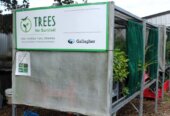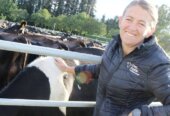Waipā residents can expect more household hazardous waste drop-off events following the district’s second being deemed another success.
“It is just a matter of providing a service for that tricky waste that people have trouble finding a place for,” said Waipā District Council waste minimisation officer Sally Fraser.
One hundred and eight residents disposed of their hazardous household waste at the Cambridge event on Sunday.

Photo: Benjamin Wilson
It was the first of its kind for the town and a follow up to an identical event in Te Awamutu in July.
“We know that there is hazardous waste out there from our audits, but it is a very small percentage, so it is just a matter of waiting until we have the time and budget to do an event,” said Fraser, who managed Sunday’s event.

Sally Fraser and Jason Richards. Photo: Benjamin Wilson
The Hastings based 3R Group was contracted to collect and dispose of the waste, which mostly consisted of paint, engine oil, herbicides, pesticides, and batteries.
“Once we get this back to Hastings, we take it all out and separate it into its disposable pathways,” said ChemCollect general manager, Jason Richards.

Jason Richards checks out a container of items on the weekend. Photo: Benjamin Wilson.
Some of the waste is sent to third parties for it to be neutralised before being disposed of in class A landfills, other waste could be sent offshore for incineration.
One of the most dangerous finds of the weekend was a container of arsenate of lead powder (arsenic), a dangerous insecticide that was once popular but is now banned.
“A lot of the older stuff is really quite nasty,” said Richards.
“The older chemicals were designed to be very effective, but not so selective.”
He said that the ‘nasty’ waste is more dangerous when it is left at homes and not disposed of properly, because children or pets could come across it.
“What we find is that people have being hanging onto stuff that they feel bad about disposing,” said Fraser.
“We want to educate people on what they can do with this stuff normally… but there are definitely things here that can’t be taken anywhere else, such as the arsenic.”

A container of arsenic was discovered on the weekend. Photo: Benjamin Wilson
Fraser said because the government is increasing its waste disposal levy, it is likely that the council will be able to hold more of these events in the future.
It costs $20 to send one tonne of household or class one waste to landfill, but this is set to increase to $60 per tonne in 2024.
“That is to help it be more economical to divert waste. At the moment, relatively speaking, sending a tonne of rubbish to landfill is cheap. But when that price goes up people will start thinking ‘maybe I should take out my scrap metal, maybe I shouldn’t put my grass clippings in there.’”
Fraser’s role and operational budget is also funded by this levy.
“We can do more exciting things because we are going to have a little bit more budget,” said Fraser.
“I will definitely do another one, it is just a question of when.”








